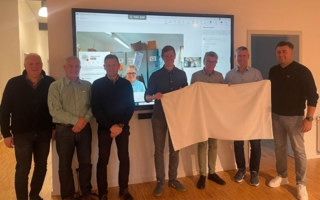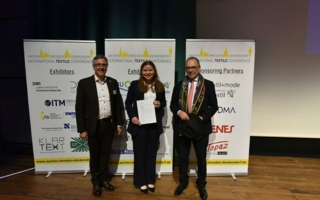17/03/2020 – Research project “next to skin fabrics” — auf Deutsch lesen
Groz-Beckert and Lucerne University
Successful cooperation project between Groz-Beckert and Lucerne University.
The research project “next to skin fabrics” of the Lucerne University deals with innovative textiles for sleep. Groz-Beckert recently became a cooperation partner and supported the project with its wide-ranging possibilities offered by its own Technology and Development Center (TEZ).
Universities, students, and researchers rely on the innovative laboratories and know-how of development partners. Because a majority of textile production has moved out of Switzerland, the research group “Products & Textiles” has found it increasingly difficult to gain access to industrial infrastructure for material experiments. Searching for a production partner for the knitted samples needed in the research project „next to skin fabrics“, the research team first turned to Reutlingen University because of their modern machinery pool.
However, the fine needle gauge needed by the research team could not be manufactured in Reutlingen why they had the suggestion to turn to Groz-Beckert. Groz-Beckert’s own Technology and Development Centre (TEZ) not only has all the gauges in the knitting sector, but also offers the possibility to knit small quantities with own materials. This enabled Groz-Beckert to produce the functional knit patterns for use during sleep with two different materials and various structures.
The Research Project
The research project “next to skin fabrics” concerns textiles for sleep. The goal: To analyze, based on the material structure and various knitted structures, the functional and aesthetic qualities of next-to-skin fabrics used during sleep and to optimize these via prototyping. In concrete terms, the collaboration with Groz-Beckert allowed knitted samples to be manufactured for haptic as well as psychological and technical examinations.
Sleep from the perspective of textile research
This research project studies sleep from the perspective of textile research. A natural fiber that absorbs the heat and moisture given off by the body, and radiates this outwards as needed, should make it easier to find sleep in the personal comfort zone. Integrated functional patches warm the body where it is cooling and cool it where it is becoming too warm.
The materials are developed by the research team from HSLU D&K together with the material scientists from Empa St. Gallen and the startup Dagsmejan Ventures AG. This company distributes functional sleep textiles around the world via online retail and offers customers scientifically-supported textile material specifications.
Further important findings on nocturnal temperature deviations and sleep activities were obtained through a collaboration with the University of Stockholm. The researchers and young entrepreneurs from Dagsmejan do not want to leave anything to chance, as sleep is still considered one of the most important contributing factors for well-being and health.
In order to obtain comparisons when evaluating the analysis model, Groz-Beckert has now knit two different natural materials in the same thread sizes and structures in order to have them haptically evaluated by test persons.
Conclusion of the Lucerne University
This collaboration proved to be exceptionally bountiful and efficient. Especially because the services we provide make it possible to do more than just use knitting machines. The personal technical consultation and sponsoring of work hours and yarn we provided contributed to the research project’s success.
Technology and Development Center (TEZ)
In July 2010, Groz-Beckert established its pioneering platform, the Technology and Development Center (TEZ) which offers spaces for trials, laboratory services and joint development including new business fields – under one roof. This is how Groz-Beckert is shaping the textile future at the TEZ together with machine builders, operators, textile manufacturers and institutes.




